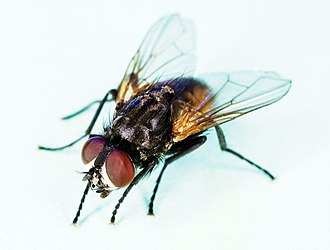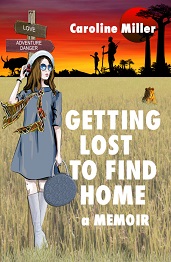
Courtesy of wikipedia.org
The fly sitting in the staircase window of my retirement center has been dead for several months. Unlike me, most folks don’t use the back exit to reach ground level. They prefer the elevator. I may be the only person in the building to bear witness to the insect’s slow decay. I could remove it with a tissue, of course. But I’m curious to know how long the corpse will remain unnoticed in its sunny location. At peace now, I can imagine an earlier, frenzied time when, without success, the fly buzzed against the glass as it struggled to reach the green world outside.
Flies have a symbolic role in my upcoming memoir, Getting Lost to Find Home. Like the character in one of Emily Dickinson’s poems, I, too, heard a fly buzz at the moment I imagined I was about to die. The sound jarred an awakening within me, the way a glacier dropping snow into an icy bay might stun the ears. The insect I realized at that moment was my superior. Had I its translucent wings, I could have hoped to escape my fate.
Many years have passed but the memory of that fly has never faded. It allowed me to feel empathy for the one that had buzzed itself to death on the windowsill. This time its wings were of no use. What it required was the ability to reason. “Each to each,” I think every time I pass its still form on the ledge. Once a defiant point of light against the dark, it has succumbed to it, as must all living things. The reminder earns my respect. And so, I pause a moment in tribute to the fly each time I make my turn on the landing.
A study on fruitflies confirms that insects are conscious of death. Most creatures are. Elephants grieve for their lost ones. Crows hold funerals. Alternatively, bees, ants, and terminates designate a specific class among them to clear away corpses from the hive. When fruitflies encounter death, they have two responses. They die earlier than their peers and the females produce a larger number of eggs under the stress.
Stress, we’ve learned, leaves a marker in the human brain. Some think the scar may predict a tendency for suicide. Others insist they require more evidence to confirm the link. Even so, physicians are aware of the debilitating effects of stress and counsel their patients to avoid it.
We already know that what we see, feel, and do alters our relationship with the world. Think of it as the butterfly effect where a small change in one location alters a larger one. A man dumps used tires into a pristine river. Others follow his example. Eventually, the river’s water is too polluted for either human or animal consumption. Flora and fauna die. The green world morphs into a desert.
We know our brains generate myriads of impulses. Some are self-destructive. Others work to our benefit. The good or ill in our lives arises from those impulses. It’s doubtful a lily can grow from a dung heap.
Those who see justice and vengeance as hospitable companions are the most likely to give way to hate. House Representatives Marjorie Taylor Green and Lauren Boebart are examples. They see corruption in the fall of a sparrow. Without trust, how is society to endure? Without trust, hate gives way to insanity–the kind that prompted an individual to salt a garden ripe with vegetables that were intended to feed the poor.
Wanting to do good is a force equal to hate but with positive benefits. Good thoughts increase trust and promote good health. Both are necessary for a thriving democracy.
Because consciousness must succumb to death, each of us faces an overwhelming question. How shall we live? Decisions we make, whether large or small, have outcomes. They affect our well-being. They affect our society and our planet. A fly dies on a windowsill, its eyes facing a green world. Too ignorant to understand the nature of the invisible barrier that stands between it and freedom, it dies in frustration.
Humans, too, live in silos of ignorance. They can respond by being angry, judgmental, and prizing freedom for themselves but not for others. If so, then like the fly, they will never know peace. Or, being human, they can exercise a second option. They can see themselves mirrored in all living things and exercise compassion.
————————————————————————————————————————————————————–
Listen to 1 hour radio interview with Caroline Miller on “Between the Covers.”

